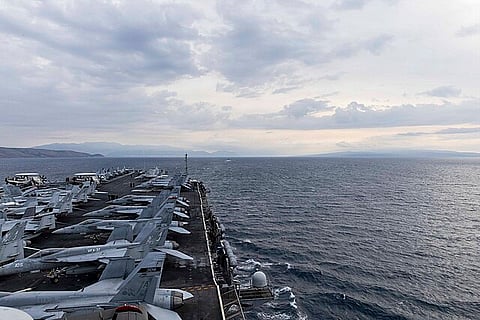

The deployment of the USS Gerald R. Ford aircraft carrier to Latin America has dramatically escalated tensions with Venezuela, which has condemned the move as an "imperial threat" and initiated its own major military mobilization. The U.S. government justifies the buildup as part of its "war on drugs," though this rationale is widely questioned by regional leaders, international bodies, and analysts who see it as a pretext for aggression against the government of Nicolás Maduro.
The arrival of the USS Gerald R. Ford strike group in the waters of the US Southern Command represents the largest U.S. military presence in the region in decades. The carrier, the world's largest and newest, is accompanied by three guided-missile destroyers and carries more than 60 tactical aircraft and over 4,000 sailors. This force joins an already substantial deployment that includes eight other warships, a nuclear-powered submarine, F-35 stealth fighter jets in Puerto Rico, and thousands of troops, creating a total deployment of around 10,000 personnel to the Caribbean. The Pentagon states this show of force will "bolster US capacity to detect, monitor, and disrupt illicit actors and activities" related to narcotics trafficking.
Venezuela has denounced the U.S. mobilization, with President Nicolás Maduro accusing the Trump administration of "fabricating a new war" and describing the naval deployment as "the greatest threat our continent has faced in the past 100 years". In response, Caracas announced a "massive deployment" of its own land, sea, air, river, and missile forces, as well as civilian militias, to counter what it labels "imperial threats". The U.S. buildup has also drawn criticism from the international community. At a recent summit of the Community of Latin American and Caribbean States (Celac), a joint declaration signed by 58 of 60 nations rejected "the use or threat of use of force" in a statement seen as a indirect critique of Washington's actions. Furthermore, Russian Foreign Minister Sergei Lavrov condemned recent U.S. strikes in the region as illegal and "unacceptable," questioning the U.S.'s stated pretext of fighting drugs.
The Trump administration has framed this massive military escalation as part of its anti-drug campaign, with the U.S. government notifying Congress that it is in an "armed conflict" with Latin American drug cartels, which it designates as terrorist groups. Since early September, U.S. forces have conducted strikes on at least 20 vessels in international waters in the Caribbean and eastern Pacific, killing at least 76 people. However, the administration has provided no evidence to the public that the targeted vessels were smuggling drugs. This lack of transparency has led to widespread skepticism. Human rights experts have stated that the strikes amount to extrajudicial killings, and the UN High Commissioner for Human Rights, Volker Turk, has denounced them as "unacceptable". Analysts and experts note that the military assets deployed are far beyond what is needed to interdict drug boats and point out that Venezuela is not a major drug producer and that most U.S.-bound cocaine travels through the Pacific, not the Caribbean.
Many observers conclude that the true objective of the deployment is regime change in Venezuela. The Trump administration has long sought the ouster of Maduro, and in August doubled its reward for information leading to his arrest to $50 million. Reporting indicates an internal policy struggle within the administration, with Secretary of State Marco Rubio championing a confrontational approach focused on Maduro's ouster, while other officials favored diplomacy. Critics argue that a military campaign to depose Maduro contradicts Trump's "America First" pledge to avoid "forever wars," with one Trump ally characterizing the push for confrontation as a "‘South Florida First’ agenda".